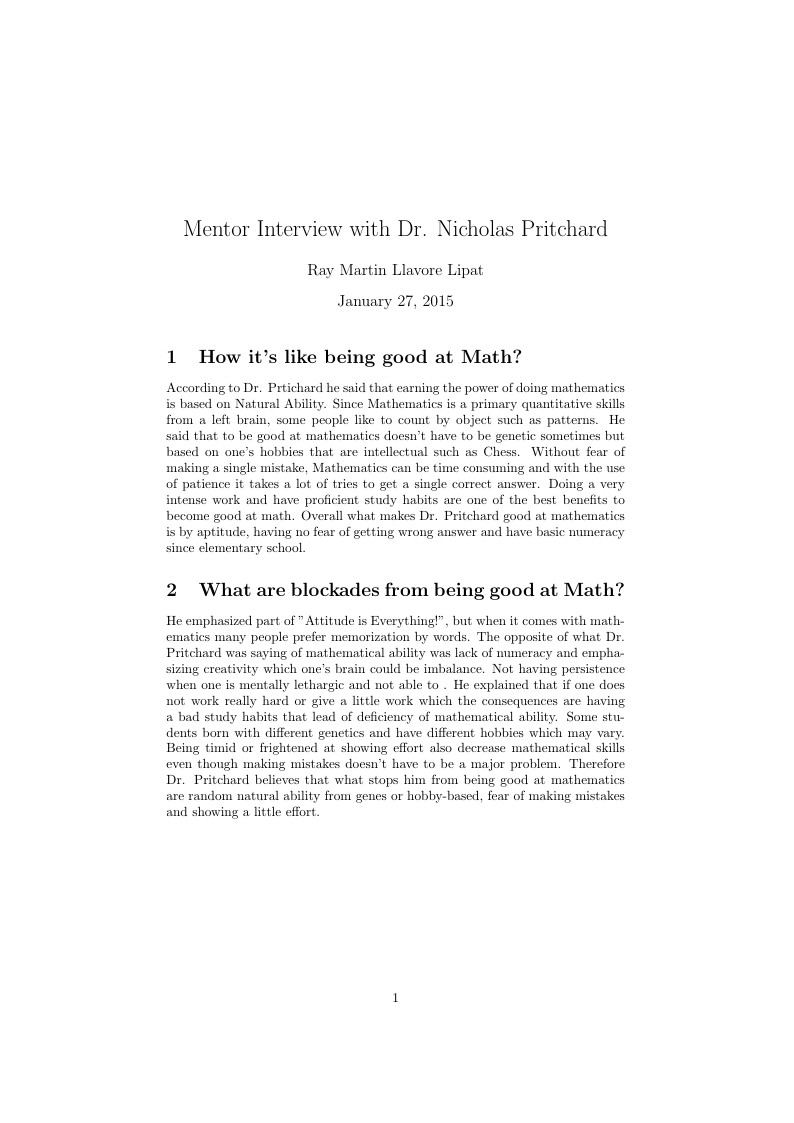
Mentor Interview with Dr. Nicholas Pritchard
Author:
Raymart Lipat
Last Updated:
11 anni fa
License:
Creative Commons CC BY 4.0
Abstract:
2nd homework

\begin
Discover why over 25 million people worldwide trust Overleaf with their work.

\begin
Discover why over 25 million people worldwide trust Overleaf with their work.
\documentclass[a4paper]{article}
\usepackage[english]{babel}
\usepackage[utf8]{inputenc}
\usepackage{amsmath}
\usepackage{graphicx}
\usepackage[colorinlistoftodos]{todonotes}
\title{Mentor Interview with Dr. Nicholas Pritchard}
\author{Ray Martin Llavore Lipat}
\date{\today}
\begin{document}
\maketitle
\section{How it's like being good at Math?}
According to Dr. Prtichard he said that earning the power of doing mathematics is based on Natural Ability. Since Mathematics is a primary quantitative skills from a left brain, some people like to count by object such as patterns. He said that to be good at mathematics doesn't have to be genetic sometimes but based on one's hobbies that are intellectual such as Chess. Without fear of making a single mistake, Mathematics can be time consuming and with the use of patience it takes a lot of tries to get a single correct answer. Doing a very intense work and have proficient study habits are one of the best benefits to become good at math. Overall what makes Dr. Pritchard good at mathematics is by aptitude, having no fear of getting wrong answer and have basic numeracy since elementary school.
\section{What are blockades from being good at Math?}
He emphasized part of "Attitude is Everything!", but when it comes with mathematics many people prefer memorization by words. The opposite of what Dr. Pritchard was saying of mathematical ability was lack of numeracy and emphasizing creativity which one's brain could be imbalance. Not having persistence when one is mentally lethargic and not able to . He explained that if one does not work really hard or give a little work which the consequences are having a bad study habits that lead of deficiency of mathematical ability. Some students born with different genetics and have different hobbies which may vary. Being timid or frightened at showing effort also decrease mathematical skills even though making mistakes doesn't have to be a major problem. Therefore Dr. Pritchard believes that what stops him from being good at mathematics are random natural ability from genes or hobby-based, fear of making mistakes and showing a little effort.
\end{document}